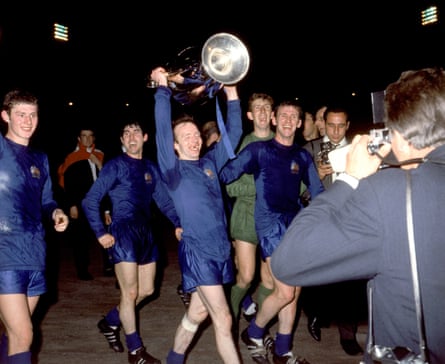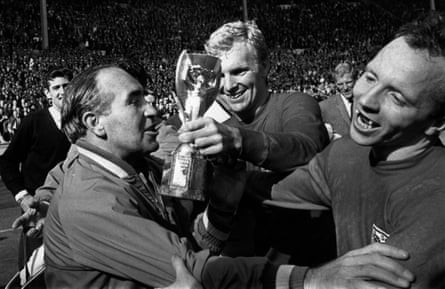Nobby Stiles, one of England’s 1966 World Cup winning heroes, has died aged 78 after a sustained period with prostate cancer and advanced dementia.
A European Cup winner with Manchester United in 1968, Stiles will be forever remembered for his victory jig at Wembley two years earlier, clutching the Jules Rimet trophy in one hand, the “Toothless Tiger’s” false teeth in the other, after England had beaten West Germany in the World Cup final.
“It’s still the biggest thing that happened to me,” Stiles, who also played for Middlesbrough and Preston, told the Guardian in 2002. “Everyone still wants a piece of you because of it. To be fair, I’m not as busy as some of the other lads. But wherever you go, what you did means so much to people. Not just lads of my age, you’d expect that. But kids of me grandkids’ age, they come up to me and go: ‘Hey, you, you’re the fella with no teeth who danced round Wembley, aren’t you?’ In a way, you end up belonging to everyone.”
Stiles’s family said he had “passed away peacefully today surrounded by his family after a long illness”. His death was met with widespread sadness and admiration for one of England’s finest footballers.
Geoff Hurst, another of England’s World Cup winners, described Stiles as “the heart and soul of the team”. He tweeted: “Hugely sad to hear Nobby has passed away. We were playing together way back for the U17s, U23s, and of course, for England, in fact, it was my first cap when Nobby scored, I think he was wearing No. 9! Great character, and the heart and soul of the team, he will be sorely missed.”

In a statement Manchester United said: “Nobby was a titan of the club’s history, cherished for his heart and personality on and off the pitch. He will be sorely missed by us all.”
Gary Neville, a formed United captain, was coached by Stiles at youth level when Stiles returned to the club in 1989. “Thank you for all you did for us,” Neville said. “You taught us how to fight for everything in that red shirt.
Stiles, a skilful and creative midfielder, was an uncompromising tackler and his robust style was the subject of some criticism during the 1966 World Cup, particularly when his “rough play” against Jacques Simon put the France playmaker out of the game. But Alf Ramsey, the England manager, stayed loyal to his ever-present, bustling midfield terrier.
“By all accounts the [FA selection] committee told him in no uncertain terms I couldn’t play, that England needed to make an example of me,” Stiles recalled. “I was a liability, they said. Alf told them he’d resign if he couldn’t pick who he wanted. He was prepared to resign in the middle of a World Cup over me. I never found that out till he’d died. Alf, what a man.”

Norbert Peter Patrick Paul Stiles, balding at 24, diminutive and short-sighted, by his own admission had to overcome numerous hurdles to become a professional footballer. In his 2003 autobiography, he wrote that he had been born “a half-blind dwarf who was bombed by the Germans and run over by a trolley bus when he was one”.
Born in Collyhurst, north-east Manchester, during an air raid on 18 May 1942, Stiles joined United in 1959 and signed professional terms the following year. He stayed with the club until 1971 and lived near Old Trafford until his death.
Stiles, like many of his England teammates, sold his medals and football memorabilia to raise money for his family. An auction in 2010 raised £425,000, with United paying a total of £209,000 for his World Cup and European Cup winners’ medals. At United he also won two league titles, in 1965 and 1967.
On leaving United Stiles joined Middlesbrough, where he spent two seasons, before finishing his playing career at Preston.
Stiles would manage Preston from 1977 to 1981, Vancouver Whitecaps in the North American Soccer League for three years, then West Bromwich Albion for five months until early 1986.
After the stint coaching for United under Sir Alex Ferguson, his latter years were characterised by his struggles with Alzheimer’s and vascular dementia and his powers of speech declined. His family were critical of the lack of support for Stiles and thought that football – and particularly the Professional Footballers’ Association – should have shown a commitment within Stiles’s lifetime to complete research on the link between heading a football and degenerative brain disease.
In 2010, aged 68, he suffered a mini stroke. He was diagnosed with prostate cancer in 2013.
Among others to pay tribute was Stiles’s former United teammate Denis Law: “Nobby was a top player and a top man. He was such a popular guy in the dressing room. Everyone knew Nobby would be there when the going got tough on the pitch, but you shouldn’t underestimate what a good footballer he was too. I played against him in training and for Scotland against England and all I can say is I’m glad he was my teammate more often than my opponent.”









Comments (…)
Sign in or create your Guardian account to join the discussion